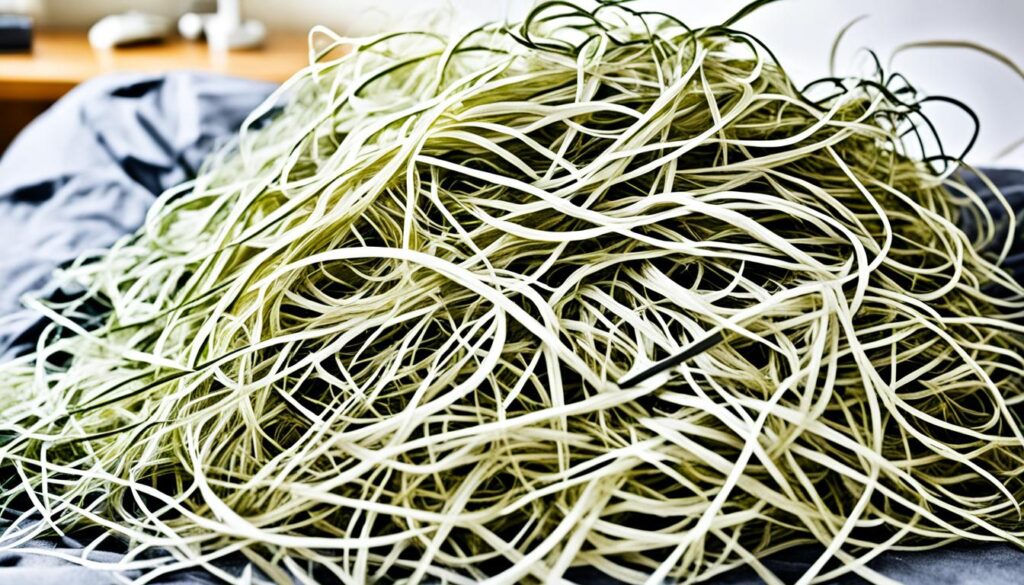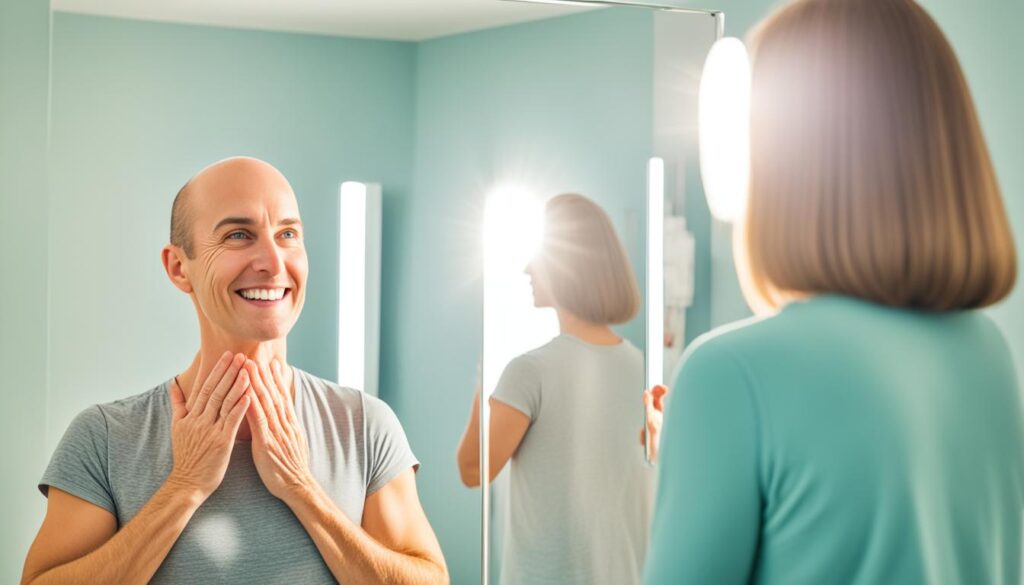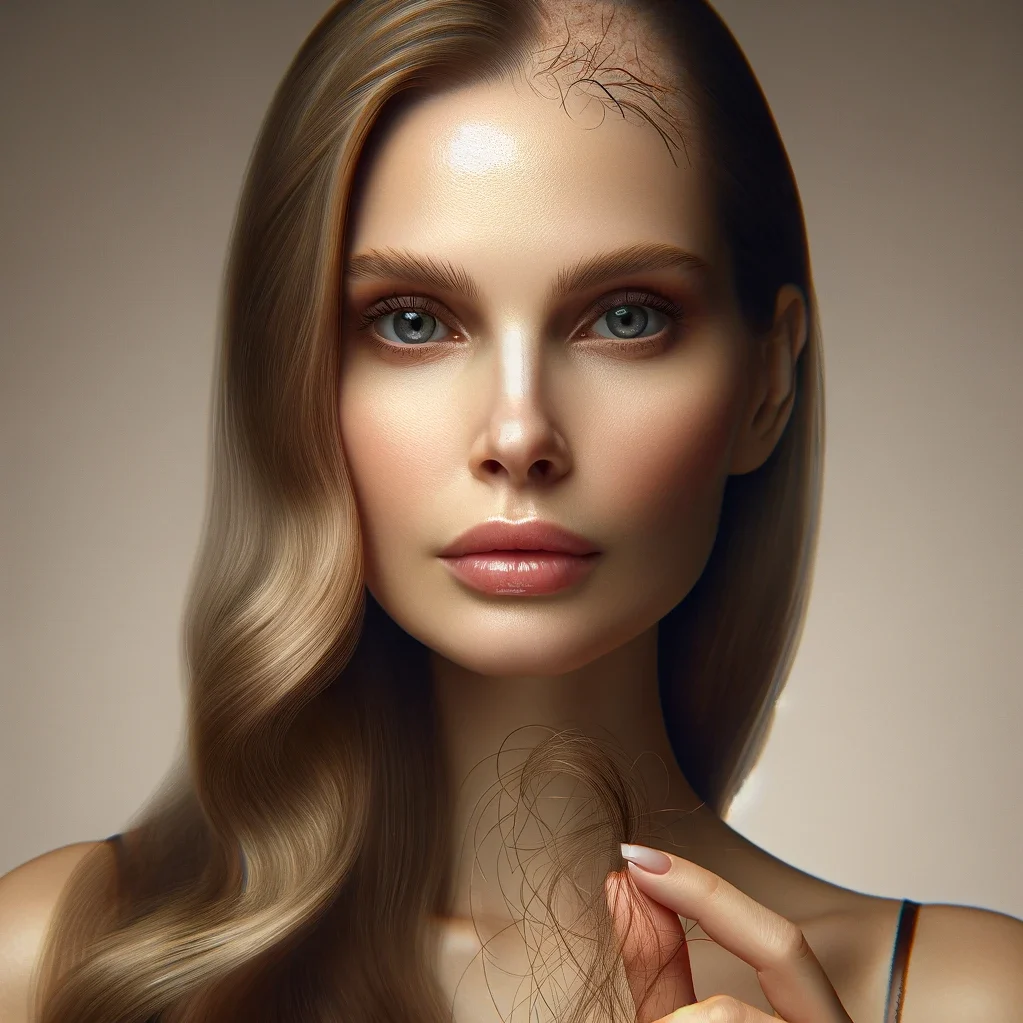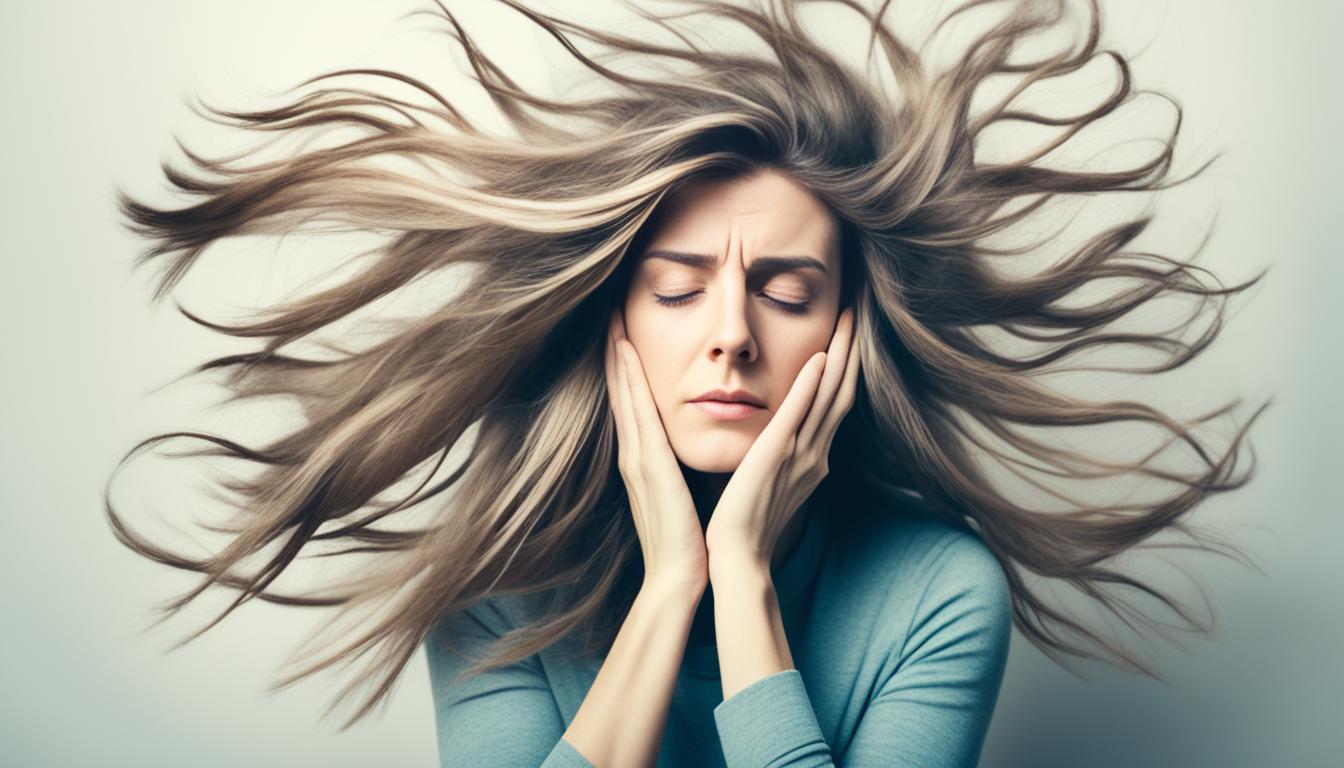Did you know that stress can cause hair loss in both men and women? In fact, according to recent studies, stress-induced hair loss affects approximately 30% of the population. The impact of stress on hair health is a pressing concern for many individuals dealing with managing stress-related hair thinning and preventing stress-caused hair fall. However, the good news is that hair loss caused by stress is usually temporary and can be reversed with the right strategies and approaches.
Key Takeaways:
- Stress can disrupt the hair growth cycle and lead to conditions like telogen effluvium, alopecia areata, and trichotillomania.
- Managing stress levels, maintaining a balanced diet, taking supplements, and exercising regularly can help recover from stress-induced hair loss.
- Switching to natural hair care products and considering dermatological treatments may also aid in regrowth.
- Recovering from stress-induced hair loss requires patience and consistency.
- Seeking medical advice is crucial if necessary.
Understanding the Link Between Stress and Hair Loss
Stress can have a significant impact on hair health and lead to hair loss. The causes of stress-induced hair loss are multifactorial, but one main mechanism is the disruption of the hair growth cycle. Increased levels of the stress hormone cortisol can interfere with the normal functioning of the hair follicles, leading to various conditions such as telogen effluvium, alopecia areata, and trichotillomania.
Telogen effluvium is the most common type of stress-related hair loss. It is characterized by a sudden increase in the number of hair follicles entering the resting phase of the hair cycle, resulting in excessive shedding. This condition is usually temporary, and the hair regrows once the underlying stress is addressed.
Alopecia areata, on the other hand, is an autoimmune disorder in which the immune system mistakenly attacks the hair follicles, leading to hair loss. Stress can act as a trigger for the onset or exacerbation of alopecia areata, causing patchy hair loss.
Trichotillomania is a hair-pulling disorder that can sometimes be caused by stress and anxiety. Individuals with this condition have an irresistible urge to pull out their hair, leading to noticeable hair loss in affected areas.
In addition to directly affecting the hair growth cycle, stress can also have indirect effects on hair health. Chronic stress can lead to reduced nutrient supply to the hair follicles, resulting in weakened and brittle hair. It can also contribute to scalp issues such as blockage of pores, which can further impede hair growth.

Does Hair Loss from Stress Grow Back? 7 Steps to Regrowth
Hair loss caused by stress is often temporary and can be reversed with time and the right techniques. It’s important to understand that regrowth may take up to a year, so patience is key. To encourage your hair to grow back, we recommend following these 7 steps:
- Reduce Stress: Incorporate stress-reducing techniques such as breathwork and meditation into your daily routine. These practices can help calm your mind and promote a healthier hair growth cycle.
- Maintain a Balanced Diet: Consume a diet that is rich in essential nutrients like vitamins and minerals. Foods such as leafy greens, lean proteins, and fatty fish can support hair regrowth.
- Take Hair Growth Supplements: Consider adding supplements to your routine that are specifically designed to promote hair growth. Look for supplements containing ingredients like biotin, zinc, and iron.
- Engage in Regular Exercise: Regular physical activity can improve blood circulation, including to the scalp, which can stimulate hair follicles and encourage regrowth. Include exercises such as jogging and HIIT workouts in your routine for optimal results.
- Switch to Natural Hair Care Products: Harsh chemicals found in some hair care products can further damage stressed hair. Opt for natural hair care products that are free from sulfates and other harmful ingredients.
- Consider Dermatological Treatments: Laser therapy and PRP therapy are dermatological treatments known to promote hair regrowth. Consult with a dermatologist to explore these options.
- Seek Medical Advice: If necessary, consult a healthcare professional who specializes in hair loss. They can assess your situation and recommend suitable medications, such as Minoxidil, to support regrowth.
Remember, regrowing hair lost due to stress takes time and consistency. By implementing these steps into your routine and taking care of your overall well-being, you can increase your chances of regaining a healthy hair growth cycle.

The Role of Diet and Supplements in Hair Regrowth
A balanced diet plays a critical role in promoting hair health and regrowth. By incorporating specific foods and supplements into your daily routine, you can provide your body with the necessary nutrients to support healthy hair growth.
The Importance of Diet:
Eating a diet rich in protein, omega-3 fatty acids, vitamins, and minerals is essential for optimal hair health. These nutrients help nourish the hair follicles and promote the growth of strong and resilient hair strands.
Protein: Including adequate amounts of protein in your diet is crucial for hair regrowth. Foods such as lean meats, eggs, legumes, and nuts are excellent sources of protein.
Omega-3 Fatty Acids: Foods like fatty fish (salmon, mackerel, sardines), chia seeds, flaxseeds, and walnuts contain omega-3 fatty acids, which help nourish the scalp and promote hair growth.
Vitamins and Minerals: Incorporating a variety of fruits, vegetables, whole grains, and lean proteins into your diet ensures you receive a wide range of vitamins and minerals essential for healthy hair growth. Vitamin C, vitamin A, vitamin E, zinc, and iron are particularly important for hair health.
Supplements for Hair Growth:
In addition to a well-rounded diet, supplements can provide an extra boost to support hair regrowth. However, it’s crucial to consult a healthcare professional before introducing any supplements to ensure they are safe and appropriate for you. Here are some supplements that have been associated with hair growth:
| Supplement | Function | Suggested Dosage |
|---|---|---|
| Vitamin B | Supports hair follicle health and growth | Follow recommended daily allowance (RDA) |
| Vitamin D | Helps regulate hair growth cycle | Follow RDA or as advised by healthcare professional |
| Vitamin E | Acts as an antioxidant, promoting hair health | Follow RDA or as advised by healthcare professional |
| Zinc | Supports hair tissue growth and repair | Follow RDA or as advised by healthcare professional |
| Biotin | Enhances keratin production, the key component of hair | Follow RDA or as advised by healthcare professional |
| Protein | Provides essential amino acids for hair growth | Follow RDA or as advised by healthcare professional |
| Iron | Supports proper blood circulation to the hair follicles | Follow RDA or as advised by healthcare professional |
Remember, while supplements can be beneficial, they should not replace a balanced diet. They should be used as a complement to a healthy lifestyle and under the guidance of a healthcare professional.
By nourishing your body with the right nutrients through a balanced diet and supplements, you can support hair regrowth and enhance the overall health of your hair. However, it’s essential to be patient, as hair regrowth takes time. Alongside a nutritious diet, make sure to follow other stress management techniques, exercise regularly, and consider other recommended treatments to promote a healthy hair growth cycle.
Exercise and Physical Activity for Hair Growth
Regular exercise and physical activity play a crucial role in promoting hair growth and maintaining overall hair health. By improving blood circulation to the scalp, exercise ensures that essential nutrients and oxygen reach the hair follicles, stimulating hair regrowth. Additionally, engaging in physical activity can help alleviate stress, a common contributor to hair loss.
Jogging for Hair Growth
Jogging is an excellent form of exercise that can benefit both your body and your hair. This moderate-intensity aerobic activity increases blood flow throughout the body, including the scalp. The improved circulation provides the hair follicles with the necessary nutrients, promoting hair growth. Incorporating jogging into your regular routine can contribute to a healthy hair growth cycle.
High-Intensity Interval Training (HIIT) workouts offer a time-efficient way to improve cardiovascular fitness and promote hair growth. HIIT involves short bursts of intense exercise followed by brief recovery periods. This type of workout stimulates blood flow, helping deliver essential nutrients to the scalp and nourish the hair follicles. Including HIIT workouts in your fitness routine can enhance hair health and contribute to stress reduction.
Practicing yoga has been associated with numerous health benefits, including improved hair growth. Certain yoga poses, such as the headstand (Sirsasana) and the downward-facing dog (Adho Mukha Svanasana), increase blood flow to the scalp. This increased circulation nourishes the hair follicles, promoting healthy hair growth. Additionally, yoga is known to reduce stress levels, helping prevent stress-induced hair loss.
“Regular exercise and physical activity can improve blood flow to the scalp, providing more nutrients and oxygen to the hair follicles.”
Benefits of Exercise for Hair Growth:
- Improved blood circulation to the scalp
- Increased delivery of essential nutrients to hair follicles
- Enhanced oxygen supply to the scalp
- Promotion of a healthy hair growth cycle
- Stress reduction and prevention of stress-induced hair loss
Incorporating jogging, HIIT workouts, or yoga into your regular exercise routine can contribute to hair regrowth and overall hair health. Remember to consult with a healthcare professional before starting any new exercise regimen, particularly if you have underlying health conditions. Stay consistent with your workouts and enjoy the benefits of exercise for both your body and your hair.
| Exercise | Benefits for Hair Growth |
|---|---|
| Jogging | Improves blood circulation to the scalp and delivers essential nutrients to hair follicles. |
| HIIT Workouts | Stimulates blood flow, promoting the nourishment of hair follicles and enhancing hair growth. |
| Yoga | Increases blood circulation to the scalp, nourishing hair follicles and preventing stress-induced hair loss. |
Switching to Natural Hair Care Products
Traditional hair care products often contain harsh chemicals that can damage the hair and scalp. To promote hair regrowth and maintain healthy-looking hair, it’s recommended to switch to natural hair care products that are free from sulfates and other harmful ingredients. By opting for natural alternatives, you can provide your hair and scalp with the nourishment they need.
When searching for natural hair care products, look for sulphate-free shampoos and conditioners. Sulphates, such as sodium lauryl sulphate (SLS) and sodium laureth sulphate (SLES), can strip the hair of its natural oils and cause dryness. By using sulphate-free options, you can gently cleanse your hair without drying it out.
Additionally, choose hair care products that contain natural ingredients known for their nourishing properties. Aloe vera, for example, can soothe the scalp, reduce inflammation, and promote hair growth. Coconut oil is another beneficial ingredient that can deeply moisturize the hair, prevent breakage, and add shine. Rosemary oil is known to stimulate hair follicles and promote hair thickness.
By making the switch to natural hair care products, you can take a proactive approach to hair regrowth and overall hair health. These products can help nourish your scalp, strengthen your hair, and create an environment that supports hair growth.
Consider incorporating natural hair care products into your routine and notice the difference in the look and feel of your hair.
| Benefits of Natural Hair Care Products |
|---|
| Gentle cleansing without stripping natural oils |
| Soothing and reducing inflammation of the scalp |
| Moisturizing and preventing hair breakage |
| Stimulating hair follicles for improved hair growth |
| Creating a healthy environment for hair regrowth |
Conclusion
Stress-related hair loss is a common problem, but the good news is that it is usually temporary and can be reversed with the right strategies. By managing stress levels through practices like meditation and deep breathing exercises, we can help reduce the impact it has on our hair. Additionally, maintaining a healthy and balanced diet, rich in essential nutrients like vitamins and minerals, is crucial for promoting hair growth and preventing further thinning.
Supplements can also play a vital role in supporting hair regrowth. Consult a healthcare professional to determine which supplements, such as vitamin B, vitamin D, or biotin, may be suitable for you in regaining a healthy hair growth cycle.
Exercise is not only beneficial for your overall well-being but can also improve blood circulation to the scalp, ensuring a better supply of nutrients to the hair follicles. Incorporating regular physical activity into your routine, such as jogging or high-intensity interval training (HIIT), can contribute to maintaining healthy hair growth.
Switching to natural hair care products is another important aspect of recovering from stress-induced hair loss. Traditional products often contain harsh chemicals that can further damage the hair and scalp. Opting for sulfate-free shampoos and conditioners, as well as products with natural ingredients like aloe vera or coconut oil, can help nourish the hair and support regrowth.
If stress-induced hair loss persists, considering dermatological treatments or seeking medical advice from a healthcare professional is recommended. They can provide personalized recommendations and, if necessary, prescribe medications like Minoxidil to stimulate hair growth.
Remember, recovering from stress-induced hair loss takes time, so be patient and consistent with your hair care routine. With the right strategies, dedication, and a holistic approach, it is possible to regain a healthy and vibrant hair growth cycle.
FAQ
What causes hair loss from stress?
Hair loss from stress is caused by a disruption in the hair growth cycle and an increase in the stress hormone cortisol. Conditions like telogen effluvium, alopecia areata, and trichotillomania can also be triggered by stress.
Can hair loss from stress be reversed?
Yes, hair loss from stress is usually temporary and can be reversed with the right strategies. However, it’s important to be patient as hair regrowth can take up to a year.
What steps can I take to encourage hair regrowth after stress-induced hair loss?
To encourage hair regrowth, you can try reducing stress through techniques like breathwork and meditation, maintaining a balanced diet, taking supplements that promote hair growth, engaging in regular exercise, switching to natural hair care products, considering dermatological treatments, and seeking medical advice if necessary.
How can diet and supplements help with hair regrowth after stress-induced hair loss?
A balanced diet rich in protein, omega-3 fatty acids, vitamins, and minerals can promote healthy hair growth. Supplements like vitamin B, vitamin D, vitamin E, zinc, biotin, protein, and iron can also support hair regrowth. However, it’s important to consult a healthcare professional before introducing supplements to your diet and to follow the recommended dosage.
Does exercise and physical activity play a role in hair regrowth after stress-induced hair loss?
Yes, regular exercise and physical activity can improve blood flow to the scalp, providing more nutrients and oxygen to the hair follicles. Jogging, HIIT workouts, and yoga have shown positive effects on hair growth. Exercise can also help relieve stress by releasing endorphins.
Are natural hair care products beneficial for regrowing hair after stress-induced hair loss?
Yes, switching to natural hair care products that are free from sulfates and other harmful chemicals can help promote hair regrowth. Look for products with ingredients like aloe vera, coconut oil, and rosemary oil, which can nourish the hair and scalp.

